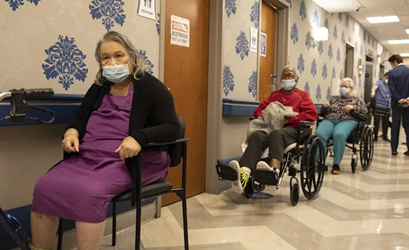|
|
Schumer Backs Plan to Expand Medicare, Add Dental, Vision, and Hearing Coverage |
|
Senate Majority Leader Charles Schumer (NY) said he backs a proposal by Sen. Bernie Sanders (VT) to include dental, vision, and hearing coverage in Medicare on Sunday. Schumer made the argument for expanding Medicare coverage during a press conference, citing the “more serious medical problems” that a gap in coverage causes. Schumer mentioned a 2020 Harvard Medical School study showing that one in every five Americans over 65 has untreated tooth decay as a reason why the additional benefits are needed. |
|
|
A new budget reconciliation bill being developed by Budget Committee chair Sanders is expected to include Medicare expansion. It would only require 50 votes in the Senate, and approval by the House, to be sent to the White House. |
|
"We need to expand Medicare to include dental, vision and hearing treatments and services and also bring down drug prices," said Robert Roach, Jr., President of the Alliance. "Quality, affordable health care is essential for a secure retirement.” |
|
Alliance Urges Congress to Lower Drug Prices Now, Saying Older Americans are “Fed Up” |
|
On Tuesday the Senate Finance Committee chaired by Sen. Ron Wyden (OR) released its Principles for Drug Pricing Reform legislation. The reforms call for allowing Medicare to negotiate lower drug prices, ensuring that consumers pay less for their drugs at the pharmacy counter, and holding pharmaceutical corporations accountable when they raise drug prices more than the overall rate of inflation are all critical.
“Our members welcome the principles for drug pricing reform released by the Senate Finance Committee. They are a step in the right direction and once enacted into law will provide real relief to the American people," said Richard Fiesta, Executive Director of the Alliance, in a press statement. “Americans continue to pay the highest prices in the world for prescription drugs, and seniors are bearing the brunt of this crisis. Older Americans are fed up and are demanding that Congress put their needs ahead of pharmaceutical corporations now, not later."
Fiesta urged the Senate and the House to move drug pricing legislation as soon as possible, adding that drug prices are going up month after month with no end in sight. |
|
Data Show Massive COVID Death Toll in Nursing Homes; Crucial Information Missing in Florida |
|
According to the most extensive examination yet of the effects of COVID-19 among its most vulnerable victims, deaths among Medicare patients in nursing homes increased by 32% last year, with two devastating increases eight months apart. According to a report from the Department of Health and Human Services’ inspector general, roughly 4 of 10 Medicare recipients in nursing homes had or were thought to have had COVID-19 in 2020, and fatalities increased by 169,291 from the year before the coronavirus arrived. |
|
|
Because it included numbers from the early part of last year, amid the original coronavirus outbreak, Tuesday’s report was the most thorough yet from the government. |
|
However, before May 8, 2020, more than four months into the pandemic, Medicare did not mandate nursing homes to report COVID-19 infections and deaths.
In addition to the missing data at the beginning of the pandemic, Florida’s Department of Health appears to have removed some data from public view. This data included the number of people who have died of the virus in each county, detailed vaccination information, and a list of long-term care facilities with coronavirus infections and deaths. The change occured when the Florida Department of Health switched its COVID-19 reports from daily to weekly earlier this month.
“Full and complete data is needed to prevent future pandemics or infectious diseases from sweeping through nursing homes,” said Alliance Secretary-Treasurer Joseph Peters, Jr. “We urge Florida to start releasing the complete information again immediately.” |
|
Black and Hispanic Americans Suffer Most in Biggest US Decline in Life Expectancy Since WWII By Liz Szabo, Kaiser Health News |
|
Although James Toussaint has never had Covid, the pandemic is taking a profound toll on his health.
First, the 57-year-old lost his job delivering parts for a New Orleans auto dealership in spring 2020, when the local economy shut down. Then, he fell behind on his rent. Last month, Toussaint was forced out of his apartment when his landlord — who refused to accept federally funded rental assistance — found a loophole in the federal ban on evictions.
Toussaint recently has had trouble controlling his blood pressure. Arthritis in his back and knees prevents him from lifting more than 20 pounds, a huge obstacle for a manual laborer.
Toussaint worries about what will happen when his pandemic unemployment benefits run out, which could happen as early as July 31.
“I’ve been homeless before,” said Toussaint, who found a room to rent nearby after his eviction. “I don’t want to be homeless again.”
With coronavirus infections falling in the U.S., many people are eager to put the pandemic behind them. But it has inflicted wounds that won’t easily heal. In addition to killing 600,000 in the United States and afflicting an estimated 3.4 million or more with persistent symptoms, the pandemic threatens the health of vulnerable people devastated by the loss of jobs, homes and opportunities for the future. It will, almost certainly, cast a long shadow on American health, leading millions of people to live sicker and die younger due to increasing rates of poverty, hunger and housing insecurity.
In particular, it will exacerbate the discrepancies already seen in the country between the wealth and health of Black and Hispanic Americans and those of white Americans. Indeed, new research published Wednesday in the BMJ shows just how wide that gap has grown. Life expectancy across the country plummeted by nearly two years from 2018 to 2020, the largest decline since 1943, when American troops were dying in World War II, according to the study. But while white Americans lost 1.36 years, Black Americans lost 3.25 years and Hispanic Americans lost 3.88 years. Given that life expectancy typically varies only by a month or two from year to year, losses of this magnitude are “pretty catastrophic,” said Dr. Steven Woolf, a professor at Virginia Commonwealth University and lead author of the study.
|
|
Thanks for reading. Every day, we're fighting to lower prescription drug prices and protect retirees' earned benefits and health care. But we can't do it without your help. Please support our work by donating below. |
|
|
|
|
Alliance for Retired Americans | 815 16th Street, NW | Washington, DC 20006 | www.retiredamericans.org



